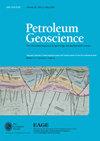Geology and petroleum prospectivity of the Sea of Hebrides Basin and Minch Basin, offshore NW Scotland
IF 2.1
4区 地球科学
Q3 GEOSCIENCES, MULTIDISCIPLINARY
引用次数: 0
Abstract
The Sea of Hebrides Basin and Minch Basin are late Paleozoic–Mesozoic rift basins located to the NW of the Scottish mainland. The basins were the target of small-scale petroleum exploration from the late 1960s to the early 1990s, with a total of three wells drilled within the two basins between 1989 and 1991. Although no commercially viable petroleum discoveries were made, numerous petroleum shows were identified within both basins, including a gas show within the Upper Glen 1 well in Lower Jurassic limestones. Organic-rich shales have been identified throughout the Jurassic succession within the Sea of Hebrides Basin, with one Middle Jurassic (Bajocian–Bathonian) shale exhibiting a total organic carbon content of up to 15 wt%. The focus of this study is to review the historical petroleum exploration within these basins, and to evaluate whether the conclusions drawn in the early 1990s of a lack of prospectivity remains the case. This was undertaken by analysis of seismic reflection data, gravity and aeromagnetic data, and sedimentological data from both onshore and offshore wells, boreholes and previously published studies. The key findings from our study suggest that there is a low probability of commercially sized petroleum accumulations within either the Sea of Hebrides Basin or the Minch Basin. Ineffective source rocks, likely to be due to low maturities (due to lack of burial) and the fact that the encountered Jurassic and Permian–Triassic reservoirs are of poor quality (low porosity and permeability), has led to our interpretation of future exploration being high risk, with any potential accumulations being small in size. While petroleum accumulations are unlikely within the basin, applying the knowledge obtained from this study could provide additional datasets and insight into petroleum exploration within other NE Atlantic margin basins, such as the Rockall Trough and the Faroe–Shetland Basin.苏格兰西北近海赫布里底群岛盆地和明奇盆地的地质和石油远景
赫布里底海盆地和明奇盆地是位于苏格兰大陆西北方向的晚古生代—中生代裂谷盆地。从1960年代末到1990年代初,这两个盆地是小规模石油勘探的目标,1989年至1991年期间在这两个盆地内共钻了3口井。虽然没有商业上可行的石油发现,但在两个盆地中都发现了许多石油显示,包括下侏罗统灰岩中的Upper Glen 1井中的天然气显示。富有机质页岩在赫布里底海盆地的整个侏罗纪演替中都被发现,其中一个中侏罗世(巴约世-巴底世)页岩显示出总有机碳含量高达15%。本研究的重点是回顾这些盆地内的石油勘探历史,并评价20世纪90年代初得出的缺乏前景的结论是否仍然存在。这是通过分析地震反射数据、重力和航磁数据、陆上和海上井、钻孔和先前发表的研究的沉积学数据来完成的。我们研究的主要发现表明,在赫布里底海盆地或明奇盆地内,存在商业规模石油聚集的可能性很低。无效烃源岩可能是由于低成熟度(由于缺乏埋藏)以及所遇到的侏罗系和二叠系-三叠系储层质量差(低孔隙度和渗透率),这导致我们对未来勘探的解释是高风险的,任何潜在的聚集规模都很小。虽然盆地内不太可能有石油聚集,但应用本研究获得的知识可以为其他东北大西洋边缘盆地(如Rockall槽和Faroe-Shetland盆地)的石油勘探提供额外的数据集和见解。
本文章由计算机程序翻译,如有差异,请以英文原文为准。
求助全文
约1分钟内获得全文
求助全文
来源期刊

Petroleum Geoscience
地学-地球科学综合
CiteScore
4.80
自引率
11.80%
发文量
28
审稿时长
>12 weeks
期刊介绍:
Petroleum Geoscience is the international journal of geoenergy and applied earth science, and is co-owned by the Geological Society of London and the European Association of Geoscientists and Engineers (EAGE).
Petroleum Geoscience transcends disciplinary boundaries and publishes a balanced mix of articles covering exploration, exploitation, appraisal, development and enhancement of sub-surface hydrocarbon resources and carbon repositories. The integration of disciplines in an applied context, whether for fluid production, carbon storage or related geoenergy applications, is a particular strength of the journal. Articles on enhancing exploration efficiency, lowering technological and environmental risk, and improving hydrocarbon recovery communicate the latest developments in sub-surface geoscience to a wide readership.
Petroleum Geoscience provides a multidisciplinary forum for those engaged in the science and technology of the rock-related sub-surface disciplines. The journal reaches some 8000 individual subscribers, and a further 1100 institutional subscriptions provide global access to readers including geologists, geophysicists, petroleum and reservoir engineers, petrophysicists and geochemists in both academia and industry. The journal aims to share knowledge of reservoir geoscience and to reflect the international nature of its development.
 求助内容:
求助内容: 应助结果提醒方式:
应助结果提醒方式:


